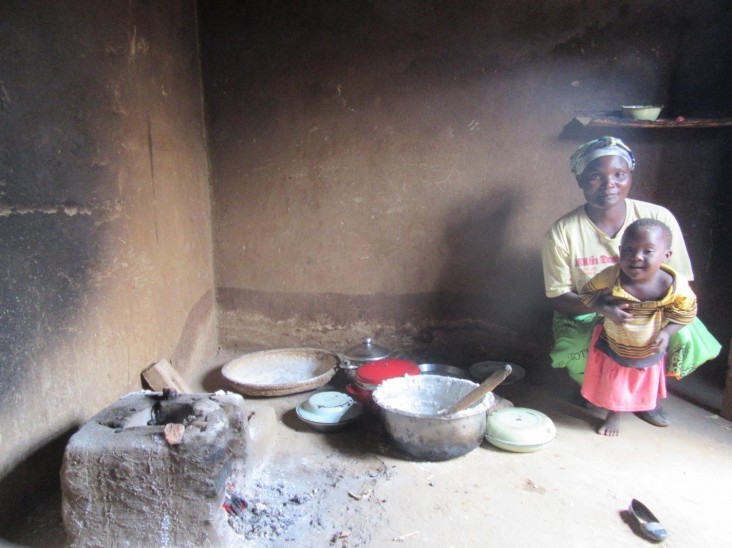
December 2016—Something as simple as a new cookstove can have a large effect on the daily lives and health of Malawian women and their families, not to mention the environment.
Merifa Muvwera’s caretaking responsibilities include her 3-year-old daughter, who was born with Down syndrome, and her 70-year-old mother-in-law, who is paralyzed from the waist down. Muvwera spends her days supervising, bathing, washing clothes, cleaning, cooking and cultivating food for her family.
Muvwera is always the first to wake and the last to sleep in her household. At 4:40 a.m., she has already started a fire, swept her house and yard as well as those of her mother-in-law, cleaned dishes from the night before, prepared the family’s breakfast, heated bathwater, and woken her husband and nine children. Before she departs for her most time-consuming chore of the day, Muvwera must wake, bathe and dress her mother-in-law and, finally, carry her outside to a sunny spot in the yard.
This is all completed by 6:00 a.m., when Muvwera, with her daughter Loveness on her back, begins the 6-kilometer round-trip journey to collect firewood. She emerges three hours later from the dusty footpath with a hard-earned headload of firewood collected along the edge of Malawi’s Perekezi Forest Reserve.
Firewood is increasingly scarce, and finding what little of it remains is no easy task. In Mzimba district, where Muvwera and her family live, 99.7 percent of households rely on firewood for cooking fuel. Muvwera used to make the trip to collect firewood three times per week to meet household needs.
That all changed in February 2016 when USAID’s Protecting Ecosystems and Restoring Forests in Malawi Project introduced Muvwera to a fuel-efficient cookstove. Now, Muvwera reports that she uses less firewood, and Loveness is safer around the new cookstove.
Muvwera’s previous cooking system consisted of three stones placed on the mud floor of her kitchen, with firewood inserted between the stones. Pots rested on top of the stones. Although mobile, the system produced an open flame, which filled the kitchen with cough-inducing smoke. Pots were not steady and sometimes tipped and spilled.
The health impacts from traditional three-stone fires—especially among women and infant children—are well-documented. Pneumonia is the leading cause of death in Malawi and one of the most common causes of morbidity: Around 300 per 1,000 children under 5 are diagnosed with pneumonia every year. Because the fuel-efficient cookstoves promoted by USAID improve combustion efficiency by 40 percent to 80 percent and substantially decrease smoke emissions and exposures, they also decrease the risk of pneumonia.
Malawi has one of the highest rates of death among infants and children under 5 (69 and 110 per 1000 live births respectively in 2009) despite having made progress toward meeting the Millennium Development Goal of reducing child mortality.
The environmental impact from the three-stone fire, which has been used historically in sub-Saharan Africa, is also clear. Malawi’s rapidly growing population and its growing demand for fuelwood have been driving deforestation and forest degradation in recent decades. The loss of Malawi’s forests is a major factor contributing to soil erosion, which not only decreases agricultural productivity for Malawi’s farmers (more than 80 percent of the population), but results in siltation and sedimentation of rivers and a loss in loss in hydropower capacity, further impacting the country’s economy.
Although Muvwera appreciates the benefits to her family and the environment, she admits that her favorite benefit is her time saved. “With the improved stove,” she says, “I collect firewood only one time a week, food cooks quicker and my pots stay cleaner and take less time to clean. The stove has given me more time to care for my family.”
With fewer firewood collection trips, Muvwera has saved six hours a week—time that she can now devote to caretaking.
Other women in the village have constructed 52 improved cookstoves, and a total of more than 110 improved stoves were built in surrounding villages.
In 2016, the USAID Protecting Ecosystems and Restoring Forests in Malawi Project supported 2,744 households in adopting improved cookstoves. This technology has helped communities like Muvwera’s to adapt to their changing climate, conserve forests, and improve their livelihoods through labor and time savings. The project, which runs from September 2014 to September 2019, works to decrease emissions and deforestation through improved forest and land use management, diversification of livelihoods, and increased energy efficiency.
LINKS
Follow @USAIDMalawi, on Facebook, on Flickr







Comment
Make a general inquiry or suggest an improvement.